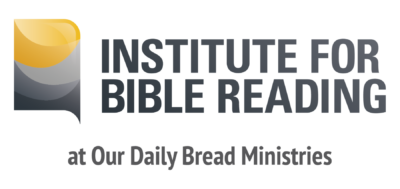How To Do Bible Study Without Chapters and Verses
We’ve been making the case over the last few months for rediscovering the power of Bible reading. In many ways, simple and straightforward reading has been the forgotten practice in the modern era of the Bible. We contend that reading whole books remains the first and most natural thing to do with the Bible.
But what about all the other things we do with the Bible? What about Bible study? Should we still be taking closer looks at smaller parts of the Bible? And does this “read first” approach have any implications for how we preach and teach the Bible? We’ll start this new mini-series of articles by taking a closer look at what it means to study the Bible.
Reimagining Bible Study
Our approach to modern Bible study grew out of the form the Bible was given in modernity and the understanding it encouraged of what the Bible is. Often this has meant pursuing topical studies based on looking up a string of Bible references and then trying to add them together to find their meaning. The very real danger is that this approach doesn’t allow for due diligence to be done on the meaning of all these Bible verses in their full and natural literary context within the Bible’s various books.

Further, even when our Bible studies stay focused on a single book, the numbered verses still imply that each individual statement can stand alone as a self-sufficient unit of meaning. At the popular level, “study” in this case often means a closer look at a verse along with the question of how it applies to my life today. Even in the more serious approach of a preacher or professor, “study” can too easily devolve into the dissection of a verse to the microscopic level of isolated words and finer grammatical points.
Of course, such detailed study has its place. But too often the core point has been forgotten that the meaning of words is found in sentences, and that of sentences in larger units like prose paragraphs or poetic stanzas. These in turn are joined together to create bigger sections which build the messages of whole books.
The place to begin with the meaning of the Bible is at the top, with the overall messages of its biggest building blocks: books.
So read first, study second.
Our definition of “Bible study” should be: consider the parts of a biblical book closely and carefully to understand their place within the book as a whole.
By adopting this definition of study we commit to first reading the largest appropriate level — the letter, the song (psalm), the gospel, the collected prophecies, or the book. Then, within that context, we can now profitably focus in on smaller units to see how they contribute to the bigger overall meaning. We keep working down this way to the smallest units we want to or are qualified to examine (aleph, anyone?) But following this course will prevent us from taking little pieces of the Bible out of context.
Consider the analogy of how we typically engage a film. Is there a difference between watching a film and studying it? Yes, of course. We all begin by simply watching a complete film to take in its overall impression on us. Then, we (or some of us) will slow down and examine smaller parts of the film in a second or third viewing to consider the individual elements (transitions, lighting, dialogue, symbols, etc.) that contribute to the larger experience of meaning.
But nobody starts by dissecting the film before watching it. Same with the Bible. We should begin by taking in the overall story, song, gospel, or letter. What is it doing as a whole book? What’s the big message? How does it work? Only then are we in a good position to take a closer look at the individual parts that make up that whole.
Nobody starts by dissecting a film before watching it. Same with the Bible.Click To TweetThis is why a fresh format of the Bible like Immerse: The Reading Bible is also a terrific study Bible. The best reader’s Bibles not only take out the modern reference numbers, they also display the natural literary forms of the Bible’s books. Our Bible study should be based on these literary units placed there by the Bible’s first authors and editors. These are the original units of meaning, the actual building blocks of the books. Studying the Bible means understanding how these natural units are doing their work in the whole book.
Also, beware an overreliance on “study helps.” Of course, none of us knows everything about the background, history, and culture of the Bible, not to mention all the fine points of the Bible’s original languages, Hebrew and Greek. So yes, getting help from the experts can greatly contribute to our understanding.
But consider this: consulting the “helps” too quickly can shut down our own reading and prayerful reflection on the text. Study notes and commentaries can be show-stoppers, ending conversation and further exploration. Reading them can tempt us to quit because we’ve just been told the right answer. When our communities gather around the Bible it’s crucial to give our own reading and dialogue ample time to marinate and mature.
So read first and read big. Feast on the sacred writings. Engage the Bible with others-reading, talking, and exploring together.
And by all means study! But study well, in context, in light of the whole, following the Bible’s own indications of its literary structure. Learn how the Bible’s books build their messages from these natural units. Examine closely how the meaning grows.
This is Bible study in the new paradigm.
Pray. Read. Study.
*Adapted from After Chapters & Verses: Engaging the Bible in the Coming Generations by Christopher R. Smith, InterVarsity Press, 2012. Rev. Dr. Smith is a Fellow at the Institute for Bible Reading. Our thanks to him for his genesis of these proposals for rethinking our use of the Bible today.

 In a recent survey the Institute conducted, we asked our audience where they usually find themselves reading the Bible. While 92% of them said they read the Bible alone or during their quiet time, only 31% said they read the Bible during their small group or Bible study. Clearly, reading the Bible alone – maybe accompanied by a cup of hot coffee and a pen – is the way most people choose to engage with God’s Word today. There’s nothing wrong with this on its own, but there’s a whole new world of understanding and engagement waiting for us if we regularly experience the Bible in community.
In a recent survey the Institute conducted, we asked our audience where they usually find themselves reading the Bible. While 92% of them said they read the Bible alone or during their quiet time, only 31% said they read the Bible during their small group or Bible study. Clearly, reading the Bible alone – maybe accompanied by a cup of hot coffee and a pen – is the way most people choose to engage with God’s Word today. There’s nothing wrong with this on its own, but there’s a whole new world of understanding and engagement waiting for us if we regularly experience the Bible in community. Many of us have been conditioned to automatically ask, “Okay, now what does this mean for me?” as we read. If a story or passage doesn’t have direct application to our lives today in the 21st century, it can be difficult to know what to do with it. Large portions of the Bible end up ignored because it’s hard to find something we can draw from it that we can start practicing immediately.
Many of us have been conditioned to automatically ask, “Okay, now what does this mean for me?” as we read. If a story or passage doesn’t have direct application to our lives today in the 21st century, it can be difficult to know what to do with it. Large portions of the Bible end up ignored because it’s hard to find something we can draw from it that we can start practicing immediately.